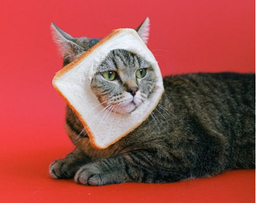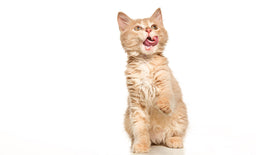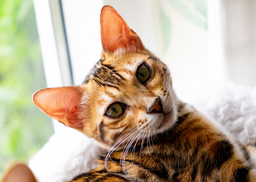The best food for cats with IBS—a comprehensive guide
What’s the best food for cats with IBS? Is there a special diet that can prevent irritable bowel syndrome? Untamed offers definitive answers!
Every feline struggling with IBS requires tailor-made meals, and there are dietary guidelines you can follow to ensure your pet’s comfort. We examine how adding specific ingredients to your cat’s meals can improve their gastrointestinal health.
What is IBS in cats?
Irritable bowel syndrome, or IBS, is an acute gastrointestinal issue mostly affecting adult and senior cats. Although not life-threatening, it’s accompanied by numerous unpleasant symptoms, such as vomiting, diarrhoea, and abdominal pain.
IBS affects the feline’s gastrointestinal tract, sometimes resulting in chronic inflammation or irritable bowel disease (IBD). Cats with IBD have trouble digesting food and often succumb to lethargy and depression.
There are several potential causes of IBS, but it’s mainly caused by a combination of environmental and genetic factors. Your cat’s lifestyle, overall health, and feeding habits contribute to the onset and development of the condition.
Irritable bowel syndrome diet for cats—how does it work?
Once your pet is diagnosed with IBS, the vet will recommend a special diet to go with the prescribed treatment. Your cat will go through a food trial to eliminate the ingredients that trigger their IBS and introduce the ones they haven’t eaten before. Besides controlling the condition, this practice helps determine the healthiest meal plan for your feline companion.
While the exact ingredients can vary, the irritable bowel syndrome diet for cats is:
- Allergen-free
- High-fibre
- Low-fat
- Highly digestible
In addition to the modified meal plan, you may also add dietary supplements to renew the healthy bacterial flora in your cat’s digestive tract. Make sure to consult your vet first before giving them probiotics.
How to find the best food for cats with IBS
Each IBS case is different, but the best way to determine the underlying cause of the condition is a diet elimination trial. This feeding pattern is also called a hypoallergenic diet because it’s based on non-allergenic, digestible nutrients.
During the trial, your cat will be exposed to protein sources that weren’t present in their meals before. Their body didn’t have the chance to develop an intolerance to the novel ingredients, so there’s no risk of inflammation. Ideally, the dietary change will soothe their stomach and help them regain regular bowel function.
Your vet can recommend any type of cat food for the trial, from homemade meals to commercial products. If you opt for home-cooking, make sure to use one type of meat per meal.
The trial typically lasts around eight weeks, but the exact time depends on your cat’s overall physical condition. Some felines show positive results within the first few days, while others can go for weeks without improvement. To increase your cat’s chances of recovery, make sure to:
- Eliminate all other food items—Don’t feed your cat treats until the trial is over
- Manage their stress levels—Stress can trigger an IBS episode, so try to maintain a calm atmosphere in your home
- Prep the meals according to their life stage—Remember that your cat’s nutritional needs change throughout their life (e.g., kittens and older cats have different energy requirements). It’s best to consult your vet regarding the portion size during the elimination trial

Make sure your cat feels safe and loved! Tummy aches are bad enough without the anxiety.
Source: MIlada Vigerova
Wet vs. dry cat food—which works better for the IBS diet?
Most cat parents find making homemade meals for their cats challenging. The meals must be ideally portioned and prepared according to strict sanitary rules.
Commercial cat food is the more reasonable solution, and there’s no shortage of products on the market. You can find both wet food and kibble labelled as safe for cats with digestive problems, but how do you know which works best for your four-legged companion?
Overall, wet and semi-moist cat food are closer to the feline natural diet. High-quality wet food tends to be:
- Moisture-rich—Staying hydrated is vital for your cat’s digestive health. Wet cat food can contain up to 78% moisture, and the high water intake will help maintain normal bowel movements
- Low-carb—Food for cats with IBS shouldn’t have a high percentage of carbs. Cats are obligate carnivores, and their metabolism can’t process carbohydrates properly
- Rich in minerals and vitamins—Whole meat overflows with bioavailable nutrients. Most manufacturers also add essential mineral supplements, such as zinc and magnesium to their products, so your cat won’t have vitamin or mineral deficiencies
Dry cat food is heavily processed and has a lower moisture content (10% on average). Even when soaked in broth or soup, it’s not particularly hydrating. Biscuits are often made with a mixture of vegetables, grain, and meat, meaning they’re highly caloric. A high-carb diet will not only affect your cat’s gastrointestinal health but can also lead to other health conditions, mainly feline obesity and diabetes.
While kibble may be useful for other health conditions (e.g., malnourishment treatment or dental disease prevention), it’s not suitable food for cats with IBS.
Untamed—the paws-down best food for cats with IBS
If you’re looking for the best food for cats with IBS, Untamed is the pick of the bunch!
Our recipes are:
- High-protein—Untamed meals are packed with animal protein and essential nutrients, such as taurine
- Made with whole meat—Because we only use whole meat for our products, each meal is nutrient-dense and light on the stomach
- Vet-formulated—Every recipe is carefully thought-out to fit your cat’s unique biological needs
- Ethically produced—We make sure our carbon footprint is brought to a minimum and only use recyclable materials for the packaging
- Irresistible—Not even a fussy eater can resist our tasty and nutritious recipes
We gently steam all our meals to make sure the original bioavailability of the ingredients is preserved during production. Untamed is a cat-loving business, and we want to make sure our food is perfect. You won’t find animal derivatives, known allergens, or other harmful substances in our human-grade delicacies!
Besides keeping your cat’s rumbling stomach in check, a long-term Untamed diet will improve their overall health. Check out the table below for a breakdown of the Untamed effect:
|
Timeline |
The Untamed effect |
|
Within a week |
● Improved bowel movement ● Healthy stool ● Increased energy |
|
After two months |
● Improved digestive tract function ● Optimal hydration ● Decreased shedding ● Shinier and thicker fur |
|
Within four months |
● Fewer hairballs ● Natural weight management ● Optimal muscle tone |
|
Long-term health benefits |
● Fewer gastrointestinal issues ● Stronger immune response ● Improved heart and kidney function ● Stable health |
Untamed recipes for the sensitive feline
If your cat is struggling with digestive issues, check out some of our most popular products for a sensitive stomach:
- Chocka Chicken with Duck in Jelly—The ultimate poultry platter, high-quality chicken breast mixed with whole duck meat, served in jelly
- Chocka Chicken in Jelly—Extra moist chicken breasts soaked in jelly and light on the tummy
- Tuck-in Tuna in Jelly—Cruelty-free tuna simmered in jelly and fish broth
- Tuck-in Tuna with Salmon in Jelly—Delicious whole meat tuna soaked in jelly and served with high-grade salmon fillet
- Chocka Chicken in Gravy—A delicious dish for the sensitive feline, made with shredded chicken breast and steamed in natural gravy
Take the Untamed online quiz to send your cat on a tantalising taste adventure!

Our Chocka Chicken with Duck in Jelly is the ultimate food for cats with IBS!
Image (c) Untamed
How to start your Untamed journey
You can treat your cat to Untamed delicacies by ordering a starter pack at a competitive price! All you have to do is:
- Visit our Try Now page and provide details about your cat
- Pick a meal plan
- Place the order
Your custom-made order will arrive within a day—we deliver cat food with free shipping. If your kitty approves, you’ll receive monthly deliveries of Untamed boxes after the trial period ends.
Since your feline companion’s well-being is our primary concern, our cat food service leaves plenty of room for tweaks and turns. You’re free to change your order at any point from your Untamed account!

Don’t let IBS get in the way of your cat’s happiness! Become a member of our community and treat your cat to tasty and nourishing meals.
Image (c) Untamed
What to do when your sensitive cat gets the munchies
Cats on a diet elimination trial are gradually introduced to novel ingredients in their food, so protein sources are limited. Refrain from giving them treats, especially store-bought products. The slightest deviation from the prescribed meal plan can induce a bout of IBS.
Once the trial is over and your cat’s condition is under control, you can try giving them some healthy meat snacks.
Felines prone to digestive disorders can benefit from high-fibre treats since they might help regulate a cat’s bowel mobility. Here’s a list of feline-friendly veggies and fruits you can give as bite-size treats:
- Watermelon
- Strawberries
- Bananas
- Pumpkin
- Squash
- Blueberries
- Blackberries
- Raspberries
- Cucumber
- Broccoli
- Asparagus
- Cat grass
Even if your cat’s IBS is no longer acting up, don’t stuff them with treats. Snacks shouldn’t take up more than 10% of your feline’s diet, or it’ll be difficult for them to maintain a healthy weight. Fibre intake shouldn’t exceed 3%, or it will do more harm than good.
Foods you should never serve your cat
Unlike humans or dogs, cats aren’t omnivorous, and numerous foods cause indigestion and other health issues in felines. Even if your cat does not suffer from IBS or other conditions, avoid feeding the following harmful items, such as:
- Chives, onions, and garlic—Allium vegetables are known to cause anaemia, kidney failure, and other chronic conditions. The substance is so poisonous to cats that even tiny amounts can cause irreparable damage if consumed regularly
- Milk and dairy—Yes, cats love milk, but they’re also lactose intolerant (like most adult mammals are). The same goes for other dairy products, e.g., cheese or cream. Even kittens who are yet to start weaning should stay away from milk unless it’s their mother’s milk or a kitten replace formula
- Raw food—In theory, raw food is the closest to what your feline companion would eat in the wild. While the so-called bones and raw foods diet (B.A.R.F.) remains popular among some cat parents, most vets find it too risky for the indoor cat. Uncooked meat contains life-threatening microbes, like Salmonella and Listeria, that are easily transmitted to humans
- Citrus—The citric acid in oranges, clementines, lemons, and grapefruit can impair your cat’s kidney function. Grapes and raisins have a similar effect, also causing hyperactivity and vomiting
- Caffeine products—Chocolate, tea, and cocoa can be fatal to felines when consumed in large quantities. The telltale signs of caffeine poisoning are tremors, difficulty breathing, accelerated heartbeat, and restlessness
- Alcohol—This substance has a disastrous effect on feline organs. Regular consumption can lead to liver and brain damage, and merely two teaspoons of brandy can put an average-sized cat into a coma
Even if it’s entirely healthy, your cat should stay away from the food items mentioned above!
Is there a difference between IBS and IBD?
Irritable bowel syndrome is an acute inflammation of the feline digestive tract. The onset is quite sudden and followed by:
- Diarrhoea
- Painful pooing
- Abdominal bloating
- Flatulence
- Nausea and vomiting
- Lethargy
- Decrease in appetite
- Weight loss
The cause of the inflammation can be anything from lifestyle changes (e.g., moving to a new home) and injuries to food intolerance. The vet will need access to your cat’s medical history and insight into their daily routine to diagnose the condition.
Besides the physical examination, further testing is also required, including blood chemistry, stool and urine analysis, abdominal X-rays, and an ultrasound. The treatment is determined based on the results and consists of dietary changes, medication, and stress management.
If the prescribed therapy doesn’t work, and your cat continuously suffers from bouts of IBS, the issue might’ve progressed into a chronic condition. Irritable bowel disease, or IBD, can be a consequence of food allergies, genetics, bacterial infections, or weak immunity.
The disease can affect different areas of the feline digestive tract, so there are several types of IBD:
- Gastritis—Inflammation of the stomach
- Enteritis—Inflammation of the small intestine
- Colitis—Inflammation of the colon
Chronic intestinal illness can only be diagnosed through a gastric biopsy.
Treating IBS in felines
Dietary therapy is the most effective treatment for IBS. Although there’s no universal meal plan available, a high-protein diet is the recommended course of action.
In addition to adjusting your cat’s feeding habits, there are other lifestyle changes you should implement. Regular exercise can ease the symptoms of IBS and improve your feline’s gastrointestinal function.
On average, playtime should be between 15 and 20 minutes each day. More active breeds, such as Maine Coons, can endure more, so there’s no need to limit them to half an hour.
IBS can also flare up due to stress and anxiety. Allow your cat to have a safe and private place in the house. Changes in routine, such as eating and sleeping hours, should be kept to a minimum. If there are any upcoming lifestyle changes, introduce them gradually.
Depending on the severity of your cat’s condition, your vet may prescribe anti-inflammatory medication in the form of:
- Corticosteroids (Prednisone, Prednisolone, Budesonide)
- Antibiotics (Metronidazole)
- Immunosuppressants
- Dietary supplements
Cat food allergies and IBS

Add pesky humans to my long list of allergies.
Source: Jack Brind
Food allergies and intolerances are known to cause irritable bowel syndrome. The severe reactions to certain food groups can disrupt the feline’s bowel function, potentially leading to chronic inflammation or IBD.
Felines typically develop food allergies between the age of two and six. When exposed to the irritable substance, i.e., allergen, the cat’s immune system has a severe reaction, manifested in:
- Bloating
- Vomiting
- Appetite loss
- Severe shedding
- Diarrhoea
- Dry, red, and flaky skin
- Itchy bottom
The exact cause of food allergies remains unknown, although we have some understanding of how they occur. Cats can react badly to a particular protein in meat (e.g., beef, pork, and lamb) and animal products (e.g., eggs). The body detects it as a potential threat, which causes an allergic reaction.
While incurable, food allergies can be kept under control with a proper diet. There are three popular options:
- Hydrolysed diet—Proteins are broken down into tiny bits so that the feline’s immune system won’t recognise them as a threat
- Novel protein diet—Your cat is exposed to novel protein sources, such as venison, kangaroo meat, rabbit, or other exotic meats
- Single-protein meals—Particular products, like Untamed’s Choka Chicken and Tuck-in Tuna, contain a single protein source which makes them suitable for cats with IBS and food allergies
The tricky part is getting your feline companion to switch to a whole new meal plan. Cats can get quite stubborn, so you may need to ease them into the new regimen. Check out a proposed timeline in the table below:
|
Day |
Old food |
New food |
|
One |
90% |
10% |
|
Two |
80% |
20% |
|
Three |
70% |
30% |
|
Four |
60% |
40% |
|
Five |
50% |
50% |
|
Six |
40% |
60% |
|
Seven |
30% |
70% |
|
Eight |
20% |
80% |
|
Nine |
10% |
90% |
|
Ten |
0% |
100% |
Hypoallergenic food is meant to subdue the immune system and prevent flare-ups, such as irritable bowel syndrome. Once you find a diet that works, your cat’s quality of life will improve significantly.

![Best food for Ragdoll cats in the UK [Broken Down]](http://untamed.com/cdn/shop/articles/featured_best_food_for_ragdoll_cats_uk.jpg?v=1646818249&width=256)

